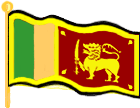A Kawi Poem
Koon sent this Kawi poem with the note: "This kawi may be some 100 years old!"
I Was Hungry and I Went to My Son's House
Poem
Poem
(Sinhala)
(English)

I was hungry, and I went to my son's house.
He measured two quarts of rice, and gave to me in a bag.
Should I take it or not? I began to hesitate and asked myself.
Did I measure the milk when I gave it to you?
Notes
Transliteration:
Badagini wela mama giya kala puthuge geta
Manala vii dekak dunnay mallakata
Gando nogando kiyala situni mata
Manalada puthe kiri dunne mama numbata?
Comments
******
Here's what Koon Wijekoon wrote about Kawi Poetry: The one I sent you is a very old Sinhala "Kawi". It is a kind of poetry written by many writers - some are many hundreds of years old. [According to Sinhala History books, the Kotte (a small town near present Kotte in Sri Lanka) period was very popular for Kawi.]
How old this is not known. The writer is also not known.
The last word in each line is separated, but belongs to the same line.
This is a rule in writing Kawi.
Each line must end with the same vowel or consonant.(giving the same sound)
In Sinhala each consonant has an inherent vowel. Letters look like curly hair!
Some rules of writing a Kawi: a Kawi in Sanskrit is a poet - in Sinhala it is Kawiya
Normally it has four lines
Each line ends with the same sound - rhyme
It should look like a paragraph giving a hint or a meaning at the end.
Rhyme in all the four lines must be respected.
All the four lines are directed to one good meaning.
Here is another Kawi I wrote sometime ago (with a recording):
Gehitula ginna pitatata gena yanna epa
Pita athi ginna getulata gena enna epa
Lebadenawanam elakiri thama gathata sepa
Eladena kaluda sududey wimsanna epa.
Do not bring the outside fire (troubles) into the house
Do not take the inside fire (troubles) to the outside (of the house)
If the cow gives milk as a subsistence food
Do not ask whether she (the cow) is black or white.
Hear this kawi here as recited by Koon.

Many thanks to Koon Wijekoon for contributing and translating this song and for singing it for us!
Thanks and Acknowledgements
Thanks to Koon Wijekoon for sharing the kawis he wrote!
Stuti!


























